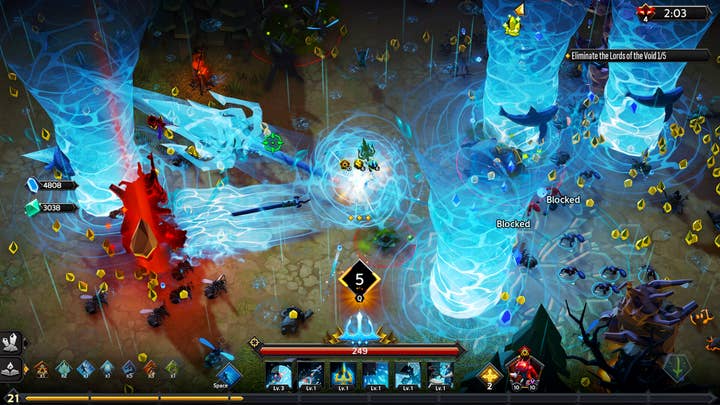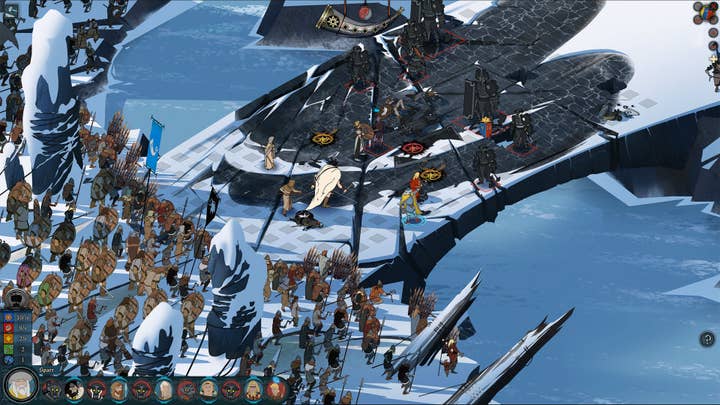Continuing Versus Evil's legacy with Digital Bandidos
Indie publishing veteran Steve Escalante shares the story behind his latest venture, and the biggest challenges in both development and publishing today
In December 2023, indie publisher Versus Evil was shut down – ten years after it first opened its doors, and two years after it was acquired by TinyBuild in a $31.3 million deal.
The news came just a couple of weeks after founder and general manager Steve Escalante announced he was leaving the company. It later emerged that Escalante, along with Versus Evil's head of production Lance James and former owner Stall Proof LLC, had been in a legal dispute with TinyBuild over whether the latter had fulfilled its obligations from the acquisition deal. This was settled in December, with TinyBuild paying $3.5 million and legal costs to settle the claims.
Escalante and James re-emerged in August at the head of a new indie-centric venture, Digital Bandidos, where they plan to draw on their experience from running Versus Evil and continue to work the ten-year-old publisher was doing.
When it comes to the way his previous business met its end, Escalante tells GamesIndustry.biz there are limits to what he can say. However, he emphasises how proud he was of that company and all who work there.
"We had the greatest Versus Evil team assembled at the time," he says. "We had a great 2023, we were kind of getting ready for 2024 and all the stuff that we had going – I was really excited about the future."
He continues: "People have asked me, what was wrong with Versus Evil? And my answer is: nothing. We had a great reputation with developers. We did some good things, we released some great games. Obviously, we had our failures, but we had quite a few successes, [and a] really good success rate. Any investment that we put into a game, for over 70% of them we got all that money back and we were paying royalties through varying degrees of success. So, a pretty good track record."
"People have asked me, what was wrong with Versus Evil? And my answer is: nothing"
All this, he says, sets up Digital Bandidos to come out of the gate swinging. The company is drawing on its founders' decades of experience, with better tools and a deeper understanding of market data than they had in 2013. Escalante adds that the new company has the advantage of starting lean – "not that Versus Evil was fat," he laughs – which allows it to be more nimble.
There's not exactly a dearth of indie publishers in the industry today, but Escalante believes the sort of expertise he and James can bring is still needed – especially given the current state of the industry, with widespread layoffs, multiple closures, and countless companies in desperate need of financing.
"There's still work to be done. There's a lot of teams that are hurting right now that need publishing support. And, other than money, the biggest thing that we've always given people back is time. [Developers] just want to make games and we just want to publish games.
"I know I can't make games and that's okay," he laughs. "It hurt my feelings once upon a time and it doesn't anymore. So what do I do? I support the people that are infinitely better at it than I am and we help them get it to market. And I think that skillset is really still pretty needed.
"Publishers are hurting almost as bad as developers. I've had lots of conversations with some of those teams and I think we're still going to see some fallout unfortunately."
Escalante also reflects on how different the landscape is now compared to when he started Versus Evil. In 2013, Steam hadn't even launched Greenlight, later replaced by Steam Direct, so getting onto the leading PC marketplace was a lot more difficult. Consoles were also harder to reach without a publisher, although platform holders were starting to work more directly with indies.

Another difference is Kickstarter and crowdfunding had only recently taken off as a way of financing projects. This actually influenced how Versus Evil was formed, with Escalante reasoning that there was a growing number of studios who were self-funding or crowdfunding, trying to break away from AAA, but lacking marketing experience and publishing resources.
Fast forward to today, however, and Kickstarter campaigns rarely raise the same level of money and attention; instead, Escalante views them "more as community-building activities rather than true funding sources." The economic realities of the industry today are different.
"All teams now need money," he says. "Very few are bootstrapping it as much as they did back then. So we're approaching it from the point of we need to stay lean as a publisher. We need to save our money because the developers need it more than we do, and we're putting that money towards them as opposed to us.
"I think we're still going to see some fallout for some great teams, you know, five-person teams, ten-person teams. And it's unfortunate. So I'm trying to basically build as much momentum as I can early on to really just jump in and help. I can't obviously help everyone but I can help some studios that need it."
"All teams now need money. Very few are bootstrapping as much as they did back in 2013. We need to save our money because the developers need it more than we do, and we're putting that money towards them as opposed to us"
Escalante is also keen to improve on some of the things he had hoped to do better with Versus Evil, such as community building and management.
"We were always really good with the developers and had a great reputation," he says. "People knew us for what we were publishing, what genres we liked, all those different things. But from a community standpoint… we certainly had some but it wasn't as big and as great as let's say, Devolver. They've always had a really great brand, a much more consumer-facing brand than we ever did. So that's something that we really are focusing on and trying to do."
He's also keen to utilise an investor group he is involved with to create an alternative financing model, one that will particularly help indie teams who already have established IP or a history of solid sales. The structure of these deals will vary, but Escalante describes them as "basically a mini-exit" where Digital Bandidos takes over publishing and potentially ongoing development for existing titles.
"Developers then get to use the cash for maybe making their next demo, maybe they're making it for finishing funds on their existing game, or maybe just take a break. There's no hooks on it, and I think that's really going to help a lot of teams.
"Plus we're able to breathe life into games that they may have had to put aside. When you're looking at some of these studios that are, let's say, five person teams, they're doing a lot of work to maintain their game. They keep it going, and the community is loving it and want it to keep going, want more content. But the developers want to make something new and they can't do both. They're five people, and that's a lot of work."

Finally, Escalante says Digital Bandidos will be much more focused on the type of games it publishes, and while it won't necessarily stick to one genre, it does want to ensure there's more crossover when it comes to who the publisher's titles appeal to.
"When I started Versus Evil ten years ago, I just wanted to work with cool people and great games," he says. "The problem is people that bought Armikrog didn't buy the Banner Saga, but the people that bought those games loved those games. It was great, but there was no cross pollination of the consumer base, and that's a lesson that we've carried over into Bandidos. What are the genres that have nice crossover? Where are we going to share some consumer base?"
"I'm trying to basically build as much momentum as I can early on to really just jump in and help. I can't obviously help everyone but I can help some studios that need it"
Escalante notes this isn't always going to work. Digital Bandidos' initial signings include action roguelite Soulstone Survivors and social deduction game Town of Salem, plus its sequel. There isn't necessarily crossover there, but the co-founder says he and his team are already in discussions with titles that would appeal to fans of Soulstone Survivors, as well as investigating more social deduction games.
He also mentions an interest in cosy simulation games – something he wanted to publish via Versus Evil – as well as strategy games, RPGs, and even some shooters. While these all seem wildly different genres, he notes that some of them will have relationships with each other.
"People that play strategy games also play RPGs – why else would there be turn-based tactical RPGs?," he concludes. "You have games and appeals that will cross over. Some of the people that played The Banner Saga would play the Pillars of Eternity and vice versa – just not all of them, and that's okay. So we're not going to be a generalist but you're not going to see some outlier, like a point-and-click adventure game that has nothing to do with any of these other games."

